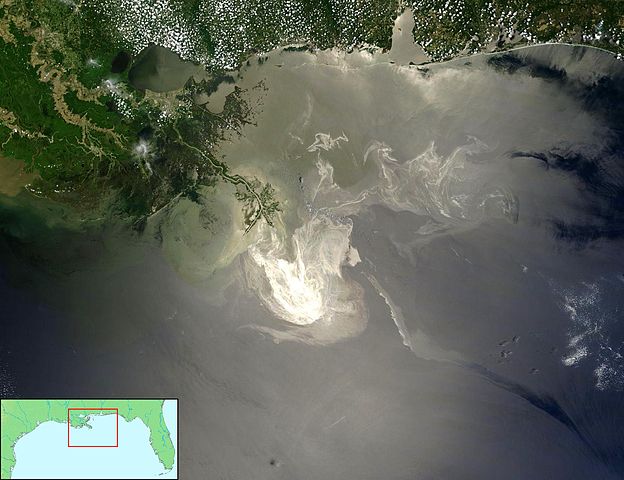
File:Deepwater Horizon oil spill - May 24, 2010 - with locator.jpg

| |
This is a file from the Wikimedia Commons. Information from its description page there is shown below.
Commons is a freely licensed media file repository. You can help. |
Summary
|
| Description |
English: Description from NASA ( source):
"NASA's Terra Satellites Sees Spill on May 24 Sunlight illuminated the lingering oil slick off the Mississippi Delta on May 24, 2010. The Moderate-Resolution Imaging Spectroradiometer (MODIS) on NASA’s Terra satellite captured this image the same day. Oil smoothes the ocean surface, making the Sun’s reflection brighter near the centerline of the path of the satellite, and reducing the scattering of sunlight in other places. As a result, the oil slick is brighter than the surrounding water in some places (image centre) and darker than the surrounding water in others (image lower right). The tip of the Mississippi Delta is surrounded by muddy water that appears light tan. Bright white ribbons of oil streak across this sediment-laden water. Tendrils of oil extend to the north and east of the main body of the slick. A small, dark plume along the edge of the slick, not far from the original location of the Deepwater Horizon rig, indicates a possible controlled burn of oil on the ocean surface. To the west of the bird’s-foot part of the delta, dark patches in the water may also be oil, but detecting a manmade oil slick in coastal areas can be even more complicated than detecting it in the open ocean. When oil slicks are visible in satellite images, it is because they have changed how the water reflects light, either by making the Sun’s reflection brighter or by dampening the scattering of sunlight, which makes the oily area darker. In coastal areas, however, similar changes in reflectivity can occur from differences in salinity (fresh versus salt water) and from naturally produced oils from plants. Michon Scott NASA's Earth Observatory NASA Goddard Space Flight Centre"
Français : Traduction partielle de la description par la NASA( source):
La marée noire causée par l'incendie de la plateforme pétrolière Deepwater Horizon vue par le satellite Terra, de la NASA, le 24 mai 2010. Cette image a été acquise par le Moderate-Resolution Imaging Spectroradiometer (MODIS, pour Spectroradiomètre d'imagerie à résolution moyenne), embarqué sur le satellite Terra. Le pétrole lisse la surface de l'océan, ce qui la rend plus claire là où elle réfléchit le soleil (par exemple, au centre de la photo) et plus sombre ailleurs (par exemple en bas à droite). Le delta du Mississippi est visible en haut, entouré d'eaux saumâtres et boueuses qui apparaissent en brun, rayé de rubans argentés de pétrole. |
||||||
| Date | 18 June 2010 | ||||||
| Source | 1/ File:Deepwater Horizon oil spill - May 24, 2010.jpg (based upon Original image with cropping) 2/ Locator by FT2 from File:Map of USA topological.png (Public domain by author demis.nl). |
||||||
| Author | NASA/ GSFC, MODIS Rapid Response AND demis.nl AND FT2 | ||||||
| Permission ( Reusing this file) |
Combined with other public domain source imagery. I as compositor of these two public domain images also release my work into the public domain - FT2 |
File usage
Learn more about Schools Wikipedia
You can learn about nearly 6,000 different topics on Schools Wikipedia. In 133 nations around the world, SOS Childrens Villages works to bring better education and healthcare to families in desperate need of support. There are many ways to help with SOS Childrens Villages.



